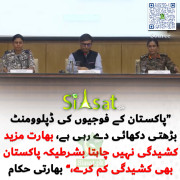Night_Hawk
Siasat.pk - Blogger
Psychology: How many senses do we have?
By Christian Jarrett

Scarlett Johansson in the film Lucy (Columbia Pictures)
We often talk of having five senses as a universal truth. In reality, there may be more or fewer depending on the way you look at the question. Christian Jarrett explains the controversy.
Daniel Kish has been blind since he was a baby but that hasn't stopped him living an incredibly active life that includes hiking and mountain-biking. To do this, he has perfected a form of human echolocation, using reflected sound waves to build a mental picture of his surroundings.
Some myths about the brain, such as the idea we only use 10% of our grey matter, are notorious, especially among neuroscientists. These myths crop up every now and then (look at the premise of the Lucy movie this summer), but they are quickly shot down by those in the know.
In contrast to these enduring stories, other misconceptions are stealthier and slip beneath the radar unrecognised. One of these is the idea that the human brain is served by five senses. This belief is so ingrained that even the scientifically literate will treat it as taken-for-granted common knowledge.
Perhaps it is due to the ideas noble origins. The principle of five basic human senses is often traced back to Aristotles De Anima (On the Soul), in which he devotes a separate chapter to vision, hearing, touch, smell and taste. Today, the five senses are considered such an elementary truth that it is sometimes used as a point of consensus before writers embark on more mysterious or contentious topics. What do we actually mean by reality? asked the author of a recent article in New Scientist magazine. A straightforward answer is that it means everything that appears to our five senses.
Incoming information
If only it were that simple. Simply defining what we mean by a sense leads you down a slippery slope into philosophy. One, somewhat vague, definition might argue that a human sense is simply a unique way for the brain to receive information about the world and the body. If that is the case, then we can claim with confidence that there are certainly more than five human senses.
First consider the senses that relate to the position of our bodies. Close your eyes, and then touch your right forefinger to your left elbow tip. Easy? How did you do it? Somehow you knew where the end of your finger was and you also knew the position of your left elbow. This sense is known as proprioception and its the awareness we have of where each of our body parts is located in space. Proprioception is possible thanks to receptors in our muscles known as spindles, which tell the brain about the current length and stretch of the muscles.

(Getty Images)
Now imagine you are blindfolded and I tilted you forwards slowly. Youd immediately have a sensation of how your bodys position was changing in relation to gravity. This is thanks to the fluid-filled vestibular system in your inner ear, which helps us keep balance. This system also gives us our experience of acceleration through space, and it links up with the eyes, making it possible to cancel out our own motion. If you wiggle your head around while reading, for example, youll see that it makes little difference to your ability to read and stay focused on the words.
There are also numerous senses providing us with information about the inner state of our bodies. The most obvious of these are hunger and thirst, inner body pain, and the need to empty the bladder or bowel. Less obvious and less available to conscious awareness are incoming signals about blood pressure, the pH level of the cerebrospinal fluid, plus many more.
Some might take that definition further, to argue that the senses should be defined by the types of receptors we have; a different sensor means a different sense. If that were the case, then even well-known senses quickly split into different varieties. For instance, if you closed your eyes and I surprised you with an ice cube down your back, youd experience a shock of cold. This sensation would be distinct from the mere touch of a plastic cube, say. Alongside temperature-sensitive receptors, packed in our skin we also have receptors dedicated to mechanical pressure, pain (known as nociceptors) and itch (pruritic receptors). Using the same logic, however, taste can be divided into sweet, sour, salty and bitter and potentially umami, which is activated by monosodium glutamate and is associated with a meaty flavour. Splitting the senses in this way doesnt feel like the most intuitive way of dealing with the question, however, and it becomes even more absurd if we turn to smell: humans have over 1,000 distinct olfactory receptors tuned to different odorous molecules. Should each one be counted as a different sense?

Your senses often blend, so that what you see can influence what you taste (Getty Images)
At the other extreme, you could restrict our definition of discrete sense to the physical categories of incoming information. We can simplify the human senses down to just three mechanical (which takes in touch, hearing and proprioception); chemical (including taste, smell and internal senses); and light.
Yet another way of approaching this issue is to think not about the category of incoming information or the perceptual experience, but about how incoming sensory information is used. A great example is the human capacity for echo-location. Human echo-location works by a person emitting a clicking sound with the tongue and listening for how it rebounds off the immediate environment. In the USA there is even a remarkable team of blind cyclists Team Bat led by Daniel Kisch, who use echo-location to go mountain biking (see www.worldaccessfortheblind.org for videos).
This ability depends on the traditional sense of hearing, but the perceptual experience and function is more akin to vision. You dont need to be blind to try it; even sighted people can learn to see in the dark using echo-location. For these reasons, some consider it a separate sense.
As you can see, there is no single, logical way to define the senses. In some ways, it might make little sense to draw divisions between them at all considering that they often seem to blend together; the colour of food and even the sounds of a restaurant can influence taste, for instance.
Understanding these relationships is important when studying conditions like synaesthesia and could even shed light on consciousness itself.
But whichever way you look at it, five is a pretty arbitrary and meaningless number a glaring myth of the brain that needs further recognition. Indeed, once you start thinking about all the different kinds of information reaching the human brain, you might even find that you develop a brand new sense a radar-like sensitivity to some of the other misconceptions regarding the way the brain experiences the world. You might have once called it a sixth sense but you know better now, dont you?
This article is based on a chapter from Christian Jarretts new book Great Myths of the Brain (Wiley).
Source
By Christian Jarrett

Scarlett Johansson in the film Lucy (Columbia Pictures)
We often talk of having five senses as a universal truth. In reality, there may be more or fewer depending on the way you look at the question. Christian Jarrett explains the controversy.
Daniel Kish has been blind since he was a baby but that hasn't stopped him living an incredibly active life that includes hiking and mountain-biking. To do this, he has perfected a form of human echolocation, using reflected sound waves to build a mental picture of his surroundings.
Some myths about the brain, such as the idea we only use 10% of our grey matter, are notorious, especially among neuroscientists. These myths crop up every now and then (look at the premise of the Lucy movie this summer), but they are quickly shot down by those in the know.
In contrast to these enduring stories, other misconceptions are stealthier and slip beneath the radar unrecognised. One of these is the idea that the human brain is served by five senses. This belief is so ingrained that even the scientifically literate will treat it as taken-for-granted common knowledge.
Perhaps it is due to the ideas noble origins. The principle of five basic human senses is often traced back to Aristotles De Anima (On the Soul), in which he devotes a separate chapter to vision, hearing, touch, smell and taste. Today, the five senses are considered such an elementary truth that it is sometimes used as a point of consensus before writers embark on more mysterious or contentious topics. What do we actually mean by reality? asked the author of a recent article in New Scientist magazine. A straightforward answer is that it means everything that appears to our five senses.
Incoming information
If only it were that simple. Simply defining what we mean by a sense leads you down a slippery slope into philosophy. One, somewhat vague, definition might argue that a human sense is simply a unique way for the brain to receive information about the world and the body. If that is the case, then we can claim with confidence that there are certainly more than five human senses.
First consider the senses that relate to the position of our bodies. Close your eyes, and then touch your right forefinger to your left elbow tip. Easy? How did you do it? Somehow you knew where the end of your finger was and you also knew the position of your left elbow. This sense is known as proprioception and its the awareness we have of where each of our body parts is located in space. Proprioception is possible thanks to receptors in our muscles known as spindles, which tell the brain about the current length and stretch of the muscles.

(Getty Images)
Now imagine you are blindfolded and I tilted you forwards slowly. Youd immediately have a sensation of how your bodys position was changing in relation to gravity. This is thanks to the fluid-filled vestibular system in your inner ear, which helps us keep balance. This system also gives us our experience of acceleration through space, and it links up with the eyes, making it possible to cancel out our own motion. If you wiggle your head around while reading, for example, youll see that it makes little difference to your ability to read and stay focused on the words.
There are also numerous senses providing us with information about the inner state of our bodies. The most obvious of these are hunger and thirst, inner body pain, and the need to empty the bladder or bowel. Less obvious and less available to conscious awareness are incoming signals about blood pressure, the pH level of the cerebrospinal fluid, plus many more.
Some might take that definition further, to argue that the senses should be defined by the types of receptors we have; a different sensor means a different sense. If that were the case, then even well-known senses quickly split into different varieties. For instance, if you closed your eyes and I surprised you with an ice cube down your back, youd experience a shock of cold. This sensation would be distinct from the mere touch of a plastic cube, say. Alongside temperature-sensitive receptors, packed in our skin we also have receptors dedicated to mechanical pressure, pain (known as nociceptors) and itch (pruritic receptors). Using the same logic, however, taste can be divided into sweet, sour, salty and bitter and potentially umami, which is activated by monosodium glutamate and is associated with a meaty flavour. Splitting the senses in this way doesnt feel like the most intuitive way of dealing with the question, however, and it becomes even more absurd if we turn to smell: humans have over 1,000 distinct olfactory receptors tuned to different odorous molecules. Should each one be counted as a different sense?

Your senses often blend, so that what you see can influence what you taste (Getty Images)
At the other extreme, you could restrict our definition of discrete sense to the physical categories of incoming information. We can simplify the human senses down to just three mechanical (which takes in touch, hearing and proprioception); chemical (including taste, smell and internal senses); and light.
Yet another way of approaching this issue is to think not about the category of incoming information or the perceptual experience, but about how incoming sensory information is used. A great example is the human capacity for echo-location. Human echo-location works by a person emitting a clicking sound with the tongue and listening for how it rebounds off the immediate environment. In the USA there is even a remarkable team of blind cyclists Team Bat led by Daniel Kisch, who use echo-location to go mountain biking (see www.worldaccessfortheblind.org for videos).
This ability depends on the traditional sense of hearing, but the perceptual experience and function is more akin to vision. You dont need to be blind to try it; even sighted people can learn to see in the dark using echo-location. For these reasons, some consider it a separate sense.
As you can see, there is no single, logical way to define the senses. In some ways, it might make little sense to draw divisions between them at all considering that they often seem to blend together; the colour of food and even the sounds of a restaurant can influence taste, for instance.
Understanding these relationships is important when studying conditions like synaesthesia and could even shed light on consciousness itself.
But whichever way you look at it, five is a pretty arbitrary and meaningless number a glaring myth of the brain that needs further recognition. Indeed, once you start thinking about all the different kinds of information reaching the human brain, you might even find that you develop a brand new sense a radar-like sensitivity to some of the other misconceptions regarding the way the brain experiences the world. You might have once called it a sixth sense but you know better now, dont you?
This article is based on a chapter from Christian Jarretts new book Great Myths of the Brain (Wiley).
Source
Last edited by a moderator:






























